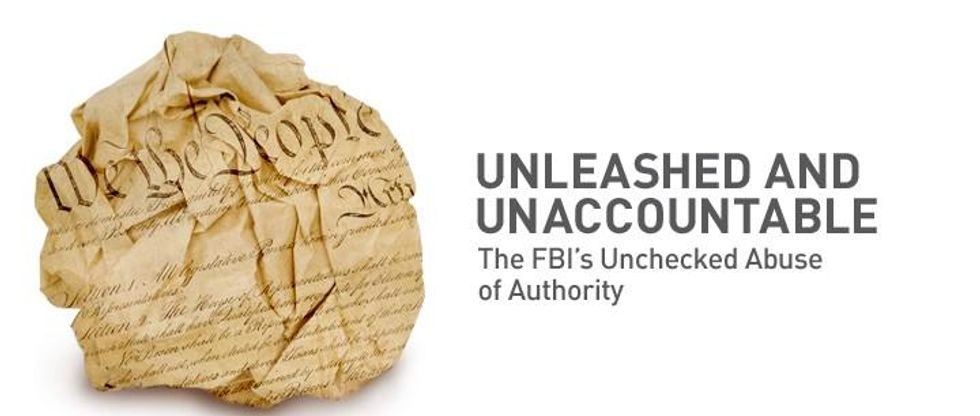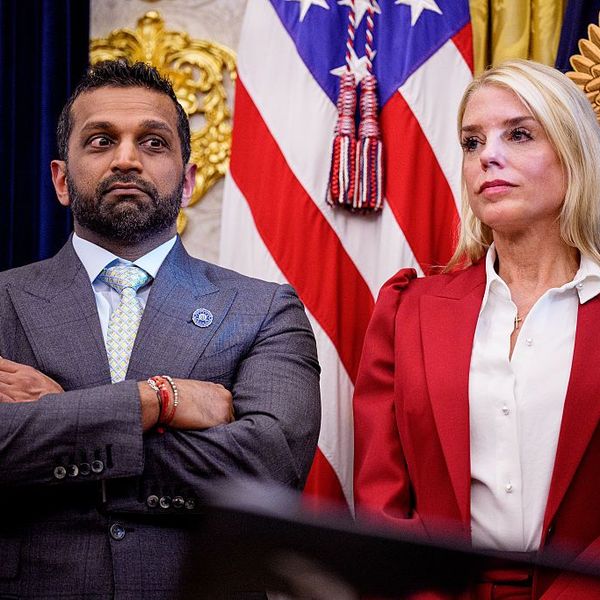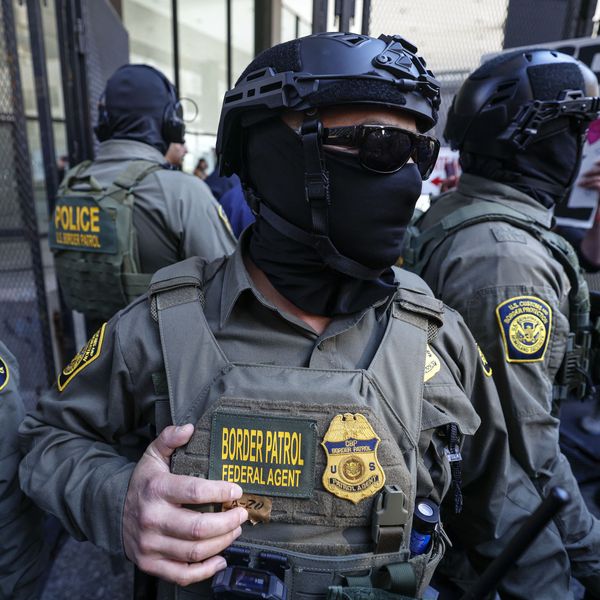'Unleashed and Unaccountable': FBI's Post-9/11 Abuse of Power
New ACLU study tracks explosion in secret surveillance and infiltration programs that trample constitutional and civil rights

Entitled "Unleashed and Unaccountable: The FBI's Unchecked Abuse of Authority (pdf)," this comprehensive report traces the explosion in the FBI's surveillance authority and reach over the past 12 years and tracks systemic violations of First and Fourth Amendment protections. As theNSA spying scandal continues to ricochet across the globe, the study paints an in-depth picture of how a political climate of permissiveness led to FBI abuse and overreach.
In the aftermath of the 9/11 attack, Congress--backed by the Department of Justice and the White House--have expanded the Bureau's authority to survey and investigate Americans, invoking the threat of terrorism to pass legislation from the Patriot Act in 2001 to the FISA Amendments Act in 2008. In conjunction with these political developments, the FBI has revised its own internal guidelines and claimed the right, according to the report, to investigate and spy on U.S. people without reasonable suspicion.
What have these expanding authorities meant in practice?
The report outlines a litany of abuses over the past 12 years, including a racial mapping program, in which FBI officials gathered demographic information on people in the U.S. and mapped communities according to their racial and ethnic composition. Abuses also included warrant-less wiretaps, as well as FBI accessing of private information from financial, telecommunications, and credit companies with no judicial approval. As recently exposed by NSA whistleblower Edward Snowden, the FBI also tracked phone calls, invoking the Patriot Act.
The ACLU report shows that the Bureau targeted protesters and religious groups with "aggressive tactics that infringe on their free speech, religion and associational rights." The Bureau has abused no-fly lists to recruit informants and unjustly targeted Chinese and Russian communities, Spanish-speaking populations, and communities of color in the United States.
Authors of the report slammed a Bureau that has been shrouded in secrecy and sheltered from public debate and criticism. "Courts have been reticent to challenge government secrecy demands and, despite years of debate in Congress regarding the proper scope of domestic surveillance, it took unauthorized leaks by a whistleblower to finally reveal the government's secret interpretations of these laws and the Orwellian scope of its domestic surveillance programs," the report reads.
The authors offer a list of 15 reforms to reign in the FBI's power and curtail well-documented and numerous constitutional violations. "The list of abuses is long and demonstrates that Congress must do a top-to-bottom review of FBI policies and practices to identify and curtail any activities that are unconstitutional or easily misused," said Hina Shamsi, director of the ACLU's National Security Project.
"The time for wholesale reform has come."
_____________________
An Urgent Message From Our Co-Founder
Dear Common Dreams reader, The U.S. is on a fast track to authoritarianism like nothing I've ever seen. Meanwhile, corporate news outlets are utterly capitulating to Trump, twisting their coverage to avoid drawing his ire while lining up to stuff cash in his pockets. That's why I believe that Common Dreams is doing the best and most consequential reporting that we've ever done. Our small but mighty team is a progressive reporting powerhouse, covering the news every day that the corporate media never will. Our mission has always been simple: To inform. To inspire. And to ignite change for the common good. Now here's the key piece that I want all our readers to understand: None of this would be possible without your financial support. That's not just some fundraising cliche. It's the absolute and literal truth. We don't accept corporate advertising and never will. We don't have a paywall because we don't think people should be blocked from critical news based on their ability to pay. Everything we do is funded by the donations of readers like you. Will you donate now to help power the nonprofit, independent reporting of Common Dreams? Thank you for being a vital member of our community. Together, we can keep independent journalism alive when it’s needed most. - Craig Brown, Co-founder |

Entitled "Unleashed and Unaccountable: The FBI's Unchecked Abuse of Authority (pdf)," this comprehensive report traces the explosion in the FBI's surveillance authority and reach over the past 12 years and tracks systemic violations of First and Fourth Amendment protections. As theNSA spying scandal continues to ricochet across the globe, the study paints an in-depth picture of how a political climate of permissiveness led to FBI abuse and overreach.
In the aftermath of the 9/11 attack, Congress--backed by the Department of Justice and the White House--have expanded the Bureau's authority to survey and investigate Americans, invoking the threat of terrorism to pass legislation from the Patriot Act in 2001 to the FISA Amendments Act in 2008. In conjunction with these political developments, the FBI has revised its own internal guidelines and claimed the right, according to the report, to investigate and spy on U.S. people without reasonable suspicion.
What have these expanding authorities meant in practice?
The report outlines a litany of abuses over the past 12 years, including a racial mapping program, in which FBI officials gathered demographic information on people in the U.S. and mapped communities according to their racial and ethnic composition. Abuses also included warrant-less wiretaps, as well as FBI accessing of private information from financial, telecommunications, and credit companies with no judicial approval. As recently exposed by NSA whistleblower Edward Snowden, the FBI also tracked phone calls, invoking the Patriot Act.
The ACLU report shows that the Bureau targeted protesters and religious groups with "aggressive tactics that infringe on their free speech, religion and associational rights." The Bureau has abused no-fly lists to recruit informants and unjustly targeted Chinese and Russian communities, Spanish-speaking populations, and communities of color in the United States.
Authors of the report slammed a Bureau that has been shrouded in secrecy and sheltered from public debate and criticism. "Courts have been reticent to challenge government secrecy demands and, despite years of debate in Congress regarding the proper scope of domestic surveillance, it took unauthorized leaks by a whistleblower to finally reveal the government's secret interpretations of these laws and the Orwellian scope of its domestic surveillance programs," the report reads.
The authors offer a list of 15 reforms to reign in the FBI's power and curtail well-documented and numerous constitutional violations. "The list of abuses is long and demonstrates that Congress must do a top-to-bottom review of FBI policies and practices to identify and curtail any activities that are unconstitutional or easily misused," said Hina Shamsi, director of the ACLU's National Security Project.
"The time for wholesale reform has come."
_____________________

Entitled "Unleashed and Unaccountable: The FBI's Unchecked Abuse of Authority (pdf)," this comprehensive report traces the explosion in the FBI's surveillance authority and reach over the past 12 years and tracks systemic violations of First and Fourth Amendment protections. As theNSA spying scandal continues to ricochet across the globe, the study paints an in-depth picture of how a political climate of permissiveness led to FBI abuse and overreach.
In the aftermath of the 9/11 attack, Congress--backed by the Department of Justice and the White House--have expanded the Bureau's authority to survey and investigate Americans, invoking the threat of terrorism to pass legislation from the Patriot Act in 2001 to the FISA Amendments Act in 2008. In conjunction with these political developments, the FBI has revised its own internal guidelines and claimed the right, according to the report, to investigate and spy on U.S. people without reasonable suspicion.
What have these expanding authorities meant in practice?
The report outlines a litany of abuses over the past 12 years, including a racial mapping program, in which FBI officials gathered demographic information on people in the U.S. and mapped communities according to their racial and ethnic composition. Abuses also included warrant-less wiretaps, as well as FBI accessing of private information from financial, telecommunications, and credit companies with no judicial approval. As recently exposed by NSA whistleblower Edward Snowden, the FBI also tracked phone calls, invoking the Patriot Act.
The ACLU report shows that the Bureau targeted protesters and religious groups with "aggressive tactics that infringe on their free speech, religion and associational rights." The Bureau has abused no-fly lists to recruit informants and unjustly targeted Chinese and Russian communities, Spanish-speaking populations, and communities of color in the United States.
Authors of the report slammed a Bureau that has been shrouded in secrecy and sheltered from public debate and criticism. "Courts have been reticent to challenge government secrecy demands and, despite years of debate in Congress regarding the proper scope of domestic surveillance, it took unauthorized leaks by a whistleblower to finally reveal the government's secret interpretations of these laws and the Orwellian scope of its domestic surveillance programs," the report reads.
The authors offer a list of 15 reforms to reign in the FBI's power and curtail well-documented and numerous constitutional violations. "The list of abuses is long and demonstrates that Congress must do a top-to-bottom review of FBI policies and practices to identify and curtail any activities that are unconstitutional or easily misused," said Hina Shamsi, director of the ACLU's National Security Project.
"The time for wholesale reform has come."
_____________________

